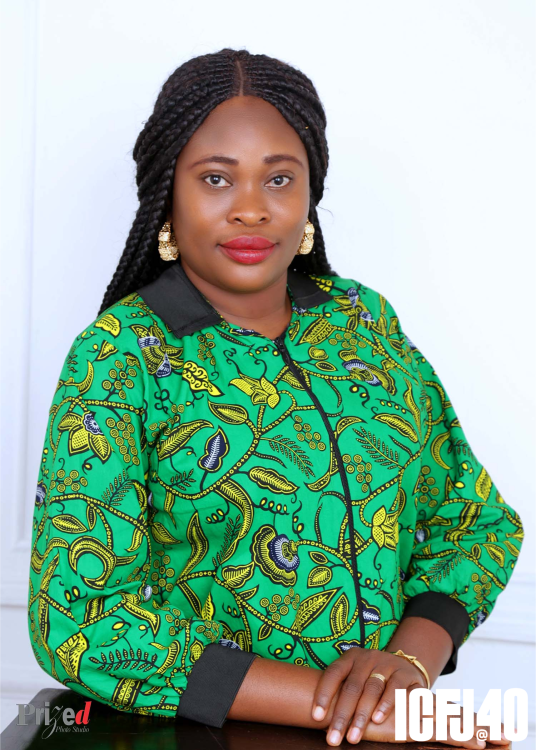Ojoma Akor is the Health Editor at Daily Trust, a Nigerian Newspaper. She’s from Nigeria and is currently based in Abuja.
Over the years, she’s received a variety of awards and fellowships.
Through an ICFJ program, she produced important work, including the first cross-border story of her career.
“The program deepened my understanding of malnutrition and the intersection with other health issues,” Akor said. “It inspired me to undertake major stories on the impact of COVID-19 on nutrition, particularly from conflicted-affected areas in my country.”
This interview has been edited.

How have you been involved with ICFJ over the years?
I participated in ICFJ’s Global Nutrition and Food Security Reporting Fellowship program in 2021 and 2022.
The program trained journalists in the U.S. and around the world on COVID-19’s impacts on global hunger, malnutrition and food security as well as opportunities to increase resilience for the most vulnerable populations in a post-pandemic world.
The program commenced with a series of webinars on malnutrition and COVID-19. Thereafter, some participants were selected for the next stage of the program, which provided an opportunity for joint reporting projects and reporting grants.
I collaborated with another participant from Yemen to do a story titled: “Severe Acute Malnutrition: Why children relapse after treatment in Nigeria, Yemen."
The story investigated the reasons for relapse in children under five years old who have been treated for Severe Acute Malnutrition (SAM) more than once in conflict settings in Nigeria and Yemen, as well as ways to address the problems.
I visited Borno state, a conflict-affected part of North-East Nigeria in March 2022 for the story. I followed the experience of children with SAM that have experienced relapse, and interviewed their parents, health workers at treatment centers, nutrition treatment volunteers, nutritionists and medical experts. I also interviewed officials of charities such as UNICEF, Médecins Sans Frontières (MSF) and Save the Children International.
I also produced a 28-minute documentary on my findings from the Nigerian side of the cross border project. It was aired on Trust TV.
There was also a Nutrition and Food Security Reporting contest organized as part of the program. I won third place in the contest. The award is given by ICFJ in partnership with the Eleanor Crook Foundation, a U.S.-based philanthropy solely dedicated to the fight against malnutrition.
The story that won me the award is about a rural community’s efforts to stave off hunger among orphans. The story, which was published in Daily Trust, used graphics, photos and videos to tell how a community in Nigeria called Dukpa donated land for communal farming of crops to serve vulnerable children, including those who had lost parents to violence in the conflict-plagued region.
What was the biggest outcome from participating in the program?
The ICFJ program gave me the opportunity, mentoring and financial support to produce my first cross-border story. The program deepened my understanding of malnutrition and the intersection with other health issues. It inspired me to undertake major stories on the impact of COVID-19 on nutrition, particularly from conflicted-affected areas in my country.
The program also spurred my interest in solutions journalism. One of the webinars on solutions journalism during the program inspired me to do a solution-based story for the story contest.
The story provided insights for other communities in Nigeria and other low-income countries on the need for ideas, initiatives that can help tackle hunger and malnutrition.
Since then, I have done other stories on tackling malnutrition in children under-five, breastfeeding, and the importance of the first 1,000 days in the lives of children.
Suffice to say the program has honed my skills for ambitious storytelling projects and collaborative or cross-border projects. These stories caused interventions and positive changes for affected persons, communities or issues, and also earned me media recognition.
Why is it so important right now to provide the kind of support to journalists that ICFJ does, especially as it relates to global health?
It helps build their capacity, equip them with skills, expand their network and help them undertake ambitious projects they wouldn't have ordinarily done without funding support.
What kind of difficulties as a journalist have you faced in Nigeria?
Dearth of funding for investigative story projects, and minimal cooperation from relevant government agencies when doing stories including for provision of requisite data and information. There are also safety risks, especially for stories in conflict areas, as well as hostile persons and parties.
Why did you choose to become a journalist?
I am passionate about unraveling societal issues and challenges and proffering insights and solutions to them, especially in helping people improve their health and access to care. Suffice to say I chose to become a journalist to cause a change in narrative and ensure positive impact in the lives of the populace.
What’s one piece of advice you’d give to an aspiring journalist?
As a journalist, give every story your best shot. Doing so is important because that story could draw attention to an issue, be the voice for the voiceless, remove shackles of captivity, expose failures and get the needed help.
Is there anything you would like to add?
I am very grateful to ICFJ for the opportunity to participate in the program. I have utilized the knowledge and support in my career, and also cascaded the learnings to other journalists.